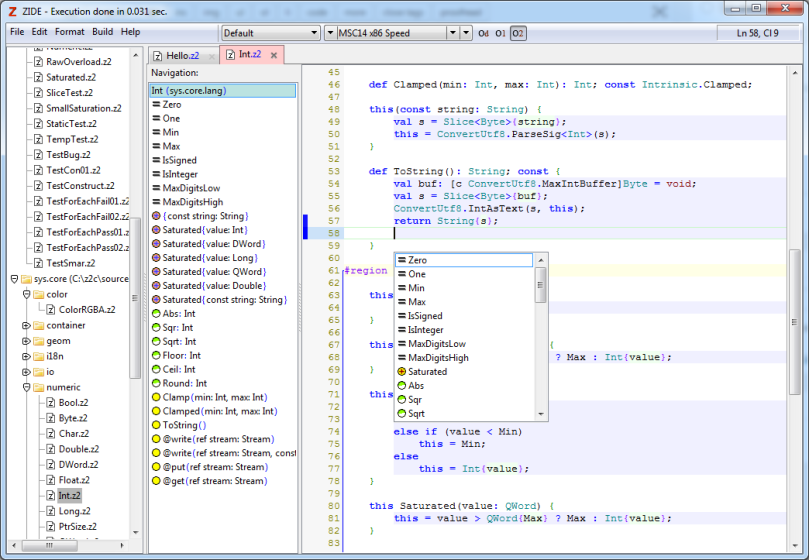About a month ago we released PT 9.1 on GitHub and since the repository has gotten zero commits. So it is time for a blog post to describe what has been going on ever since.
Immediately after the release, like on the same day, work started on code auto-complete for ZIDE. It is a bit rudimentary for now and only works on top-level expressions, but we focused a lot on getting it to feel just about right. ZIDE has received in the past simple code navigation capabilities which after a few more passes should do a fair job. Now it received auto-complete, which again after a few more passes will be decent. This is the pattern. The next thing we will add to ZIDE will be related to breakpoints, so you can step though your code and debug. Here is a screenshot of auto-complete in action:
Slowly but surely ZIDE should become a decent editing tool. ZIDE is not on GitHub yet, so these changes did not result in any commits. But on the other hand, a first pass of cleaning it up has been done and it is fairly close to be in a good shape for OSS, so the code should be committed in about 2-3 months tops.
Next the subject of Linux was tackled for the first time! Step one was creating a development environment. Now, there are 200.000 incompatible versions of Linux out there, so we can’t just pick one up and use it with a native install. We need a flexible approach, being able to move from one Linux to another with ease, so it was decided to use virtualization.
First I tried VirtualBox, but I’m not sure if I managed to get it to work right. I’m sure it is a great tool, but my sample compiles lasted around 9 minutes. This is completely unacceptable performance. So I abandoned the idea of VirtualBox and switched over to VMWare Player. The same sample compile took 1:08 minutes, so this is what we shall be using.
Then a Linux distribution was selected: Mint Linux 18. We will try to support more popular versions, but for the first release, only one version can be supported due to time constrains. With z2c, zut and ZIDE, there are 3 tools that need to be ported, tested and maintained. Not to mention porting over the standard library.
After all this came the lengthiest part: the actual porting. The project is routinely compiled with MINGW to make sure that it is not accidentally using some Windows specific stuff, but apparently MINGW is designed to emulate Visual C++ behavior and a few things did not compile under GCC. These errors had to be fixed.
Other problems followed. Did you know that Windows uses ‘\’ and Linux uses ‘/’? We sure did. My day job is actually as a Linux programmer. So I made sure that the code base was portable, both related to ‘/’ vs ‘\’ and file name case sensitivity. But still, a couple of issues managed to squeeze though and it took a while to track them down. There are still a few minor bugs in the compilers, but it will soon be done.
ZIDE also had its fair share of small bugs, like it completely refusing to resize in both dimensions. Not a huge problem, but certainly something that is annoying and made you look quite unprofessional. There are also some minor X specific bugs with auto-complete, including the fact that pressing the PrintScreen key causes the autocomplete window to close, so creating the screenshot with it under Linux is for now impossible.
And finally, the actual porting of the library. There are still some parts to be implemented and the fixing of the above mentioned bugs, but in about one week, PT 9.1.5 should be out. It will be highly experimental, but it should detect the presence of both 32-bit and 64-bit G++. PT 9.2 should have a more robust Linux support, including Clang support.
With all this out-of-the-way, it is time to talk about Linux distribution and OSS. Our goal is to make every part of the project OSS and this is why the standard library was OSS and available from day one. But just the act of doing the initial porting to Linux took more than a month, a month in which other than auto-complete, nothing else was done. PT 9.1.5 will have the exact same features as 9.1 with the only difference being Linux support too.
Other than the standard library, all parts will be OSSed, one by one, but this will take a lot of time. Porting to Linux shut down the progress on the language by a month and OSSing everything would shut us down for over half a year. We can’t afford to not update the language and standard library for half a year, so there is only one solution.
For the next few months, Linux versions will be binary only distributions! I understand that this is a contentious subject, but there is no way around it! This is why the Linux support is marked as unofficial. It works and is getting better and better by the day, but since we don’t have the resources to do anything more than binary distribution, these releases are not official: they are available if you want to try them, if not, wait for the official release.
In conclusion, PT 9.1.5 is about to come out with its only feature being Linux support, binary distribution only, and then, PT 9.2 should have proper new features for the language and 9.4 should see the language near completion, only excluding the most advanced features.
